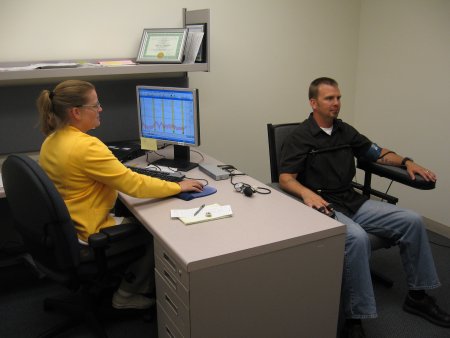Are lie detector tests admissible in court?
Functional Magnetic Resonance Imagining Lie Detector Tests are Generally Not Admissible in Federal Court

Lie Detector Tests are Not Admissible in Federal Court
In a case of first impression, the Sixth Circuit Court of Appeals (which covers Michigan) determined as a matter of first impression that results from a functional magnetic resonance imaging (fMRI) polygraph test (a lie detector) should not be admitted into evidence in a federal criminal case. Lie detector tests are generally not admissible in court, with few exceptions.
United States v Semrau involved a Ph.D. psychologist accused of overbilling Medicare for a higher level of services than what was actually provided. One of the defenses was that the fMRI lie detector test showed the defendant to be generally truthful. The trial court excluded the test results under FRE 702, stating (1) there were no reliable or measurable error rates for fMRI lie detection testing, and (2) there was uncertainty as to whether the principles and testing methods had been applied reliably to facts of the defendant’s case. The Sixth Circuit Court of Appeals concluded that the jury would likely be confused rather than helped by the expert testimony and evidence. The results were also inadmissible under FRE 403 due to concerns about using lie-detection test results solely to bolster credibility.
Polygraph Test Results Might Be Admissible in a Michigan Case
In Michigan, polygraph test results are generally not admissible as evidence in court due to concerns over their reliability. However, polygraph results can play a crucial role in a specific legal context: when challenging the voluntariness of a confession or the suppression of evidence.
If a defendant claims that their confession was coerced or not given voluntarily, the results of a polygraph test may be considered during a hearing about this claim. The purpose here isn’t to prove the truth or falsehood of the statement made under the polygraph but rather to provide additional context about the circumstances under which the confession was made. Essentially, the polygraph results could be used to support an argument that a confession was coerced or to challenge the credibility of how evidence was obtained or presented.
This nuanced use of polygraph tests is distinct from directly admitting polygraph results as evidence of guilt or innocence regarding the charges in a case. Instead, it’s about the broader context of ensuring that a defendant’s rights were respected during the investigation process and that the integrity of the evidence against them was maintained. Even in this scenario, the admissibility of such results is subject to a judge’s discretion and the specifics of the case, reflecting the judicial system’s careful consideration of polygraph tests’ reliability and relevance.

Why Might Someone Agree to Take a Polygraph Test?
Someone charged with a crime might agree to take a polygraph test for several reasons, often related to their defense strategy or the specifics of their case. Here are some of the key reasons:
- To Demonstrate Innocence: A defendant might agree to take a polygraph test in an attempt to demonstrate their innocence to the investigators or prosecutors. If they believe they are not guilty of the charges, they might see the polygraph as an opportunity to provide some evidence of their truthfulness.
- To Gain Favorable Treatment: In some cases, agreeing to a polygraph test might be seen as a cooperative move that could potentially lead to more favorable treatment from prosecutors, such as considerations for plea negotiations or even the dropping of charges if the prosecution views the results favorably. Sometimes, a prosecutor will agree to dismiss charges altogether if the defendant passes a polygraph test.
- To Create Doubt: Although polygraph results are generally not admissible in court, if the defendant passes the test, their attorney might use the fact that they voluntarily took and passed a polygraph to create doubt about their guilt during pre-trial negotiations or in discussions with the prosecution.
- Strategic Legal Moves: In certain legal strategies, a defense attorney might advise a client to take a polygraph test as part of a broader plan. For example, if the results are favorable, the attorney might use them to negotiate with the prosecution or bolster the defendant’s credibility.
- Psychological Pressure: Some defendants might agree to a polygraph under psychological pressure or because they feel it might be their only chance to prove their innocence, especially if they believe the evidence against them is overwhelming or misconstrued.
- Public Perception: In high-profile cases, a defendant might take a polygraph test to influence public opinion, aiming to demonstrate their willingness to submit to scrutiny and assert their innocence, even if the results aren’t directly used in court.
It’s important for defendants to consult with their attorney before agreeing to take a polygraph test, as the implications can be complex and vary depending on the specifics of the case. The decision should be made with a clear understanding of the potential risks and benefits, considering the test’s limited legal admissibility and the broader context of their defense strategy.
Creative Criminal Defense
The fact that United States v Semrau, involving a lie detector test admissibility, made it to the federal court of appeals is due to a criminal defense attorney’s creativity. It is part of the criminal defense attorney’s job to protect a client’s constitutional rights, raise all defenses that are available to them, and, when possible, think “outside the box” and develop new theories that can, or may, apply to the client’s particular case. Talking with the police, including making statements during a polygraph examination, is precarious. Lying to a federal agent, even a polygraph examiner, can result in criminal charges.
Can someone take a private polygraph test before a police one?
Yes! A criminal defendant can undergo a private polygraph test before deciding whether to agree to a polygraph test conducted by the police. Opting for a private test first can serve several purposes from a legal defense perspective. It allows the defendant and their legal team to gauge how the defendant might react to the stress and questioning involved in a polygraph examination. This preliminary step can be crucial for developing an informed strategy, especially in deciding if participating in a police-administered test is in the defendant’s best interest.
The confidentiality of a private polygraph test is another significant advantage. The results are known only to the defendant and their attorney, allowing them to make strategic decisions without the obligation to share the outcomes with prosecutors or law enforcement. This control can be critical, especially if the test results could influence the direction of the defense strategy or negotiations with the prosecution.
Furthermore, undergoing a private polygraph test provides an opportunity to assess the strength of the defendant’s case and their credibility. Favorable results might embolden the defense approach, while less favorable outcomes could prompt a reevaluation of the case strategy without exposing these weaknesses to the prosecution. Additionally, selecting a private polygraph allows for the choice of an experienced and unbiased examiner, unlike a test administered by police, which might be seen as less favorable to the defendant.

Fearless, aggressive Michigan criminal defense lawyers
The lawyers with LEWIS & DICKSTEIN, P.L.L.C. have decades of experience defending clients charged with state and federal crimes. We have represented criminal defendants across Michigan and the United States. If you, or someone you know, needs an aggressive and creative defense on a state or federal criminal charge, please contact the attorneys at LEWIS & DICKSTEIN, P.L.L.C. for a free consultation today. We will take the time to talk with you, answer your questions, and address your concerns. Together, we can develop a winning strategy! In some cases, it might be advisable to take a lie detector test, but the admissibility of the results is a separate issue. A lie detector test might not be admissible, but the result might favorably influence a plea bargain or sentence agreement.
Call us today at (248) 263-6800 for a free consultation or complete an online Request for Assistance Form. We will contact you promptly and find a way to help you.












